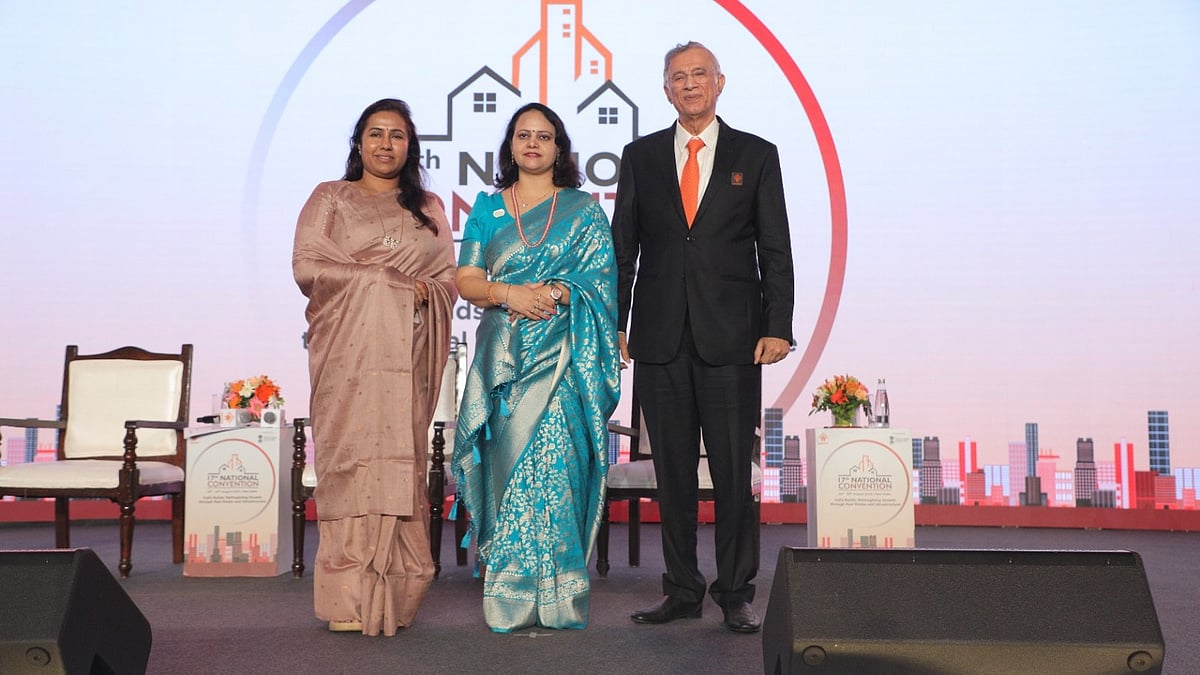NAREDCO 17th National Convention: Reimagining India’s Growth Through Real Estate And Infrastructure
The 17th NAREDCO National Convention highlighted effort being made to frame infrastructure-related policies, including those that promote housing

The NAREDCO 17th National Convention with the theme ‘India Builds: Reimagining Growth through Real Estate and Infrastructure,’ held at New Delhi, brought together policy makers, industry leaders, economists, and stakeholders from across the country.
Addressing the attendees, Meghana Sakore Bordikar, Minister of State (MoS), Government of Maharashtra, said that the Government of Maharashtra will make every possible effort to frame infrastructure-related policies, including those that promote housing in the State, in line with changing requirements.
She shared that recommendations submitted to the State Government at the conclusion of the convention — relating to new town planning, sewage and water management, recycling of water, and incentives to industry — would be duly considered in accordance with the current needs of the sector.
The MoS remained non-committal on the issue of rationalising stamp duty in Maharashtra. She added that while no immediate promises could be made on that front, the Government is committed to doing its best for progressive infrastructure development, which it is already actively pursuing under the current regime.
The State of Maharashtra is also prioritising sustainable development to address water scarcity. Plans include revamping water resources and ponds for improved yield. With support from the Central Government, Maharashtra is also focusing on river connectivity and extending subsidies for primary infrastructure and basic amenities.
Perspectives
During the convention, Dr. Niranjan Hiranandani, Chairman, NAREDCO, called for a new blueprint of infrastructure policies in the present context. He emphasised that the housing and real estate sector must grow at a rate of at least 15% annually for India to achieve developed-nation status well before the targeted year of 2047.
ALSO READ
G. Hari Babu, President, NAREDCO, said, “The 17th National Convention reflects the collective voice of India’s real estate and infrastructure industry. It is a platform where policymakers, industry leaders, and stakeholders come together to chart a roadmap for inclusive growth. The discussions and recommendations emerging from this convention will play a crucial role in shaping the sector’s contribution to India’s vision of becoming a developed economy.”
Smita Patil, President, NAREDCO MAHI, urged the State Government to extend comprehensive policy support to the real estate industry so that existing gaps are addressed and collaboration between the Government and stakeholders can drive inclusive growth in infrastructure and housing.
Trends
A report titled ‘Affordable Housing: Tackling Urban Housing Deficit Through Supply-Side Reforms’ by Knight Frank India in association with NAREDCO, released during the event highlighted the critical supply challenges in India’s affordable housing sector.
According to the report, the supply-to-demand ratio for affordable housing across the top 8 cities has plummeted to 0.36 in 2025 (until June), down from 1.05 in 2019, signalling a significant undersupply in the segment.
ALSO READ
Challenges
This shift marks a turning point from the years when developers launched more affordable housing units than were sold, driven by schemes such as the Pradhan Mantri Awas Yojana (PMAY). In contrast, 2025 data show launches have collapsed to barely a third of sales, underscoring a deepening imbalance that threatens to impact housing affordability and limit buyer choice.
Over the past decade, policy interventions such as PMAY, Affordable Rental Housing Complexes (ARHCs), and tax benefits have provided critical support to homebuyers. These measures improved affordability and expanded access to credit for economically weaker sections and low-income groups.
However, the report finds that supply continues to lag demand as developers face mounting challenges including high land costs, limited access to construction finance, regulatory delays, and inadequate infrastructure in peripheral urban zones.
Insights
Shishir Baijal, Chairman and Managing Director, Knight Frank India, said, “Affordable housing is not only a social priority but also an economic necessity. As India urbanizes rapidly, the imbalance between supply and demand in this segment poses significant risks to inclusive growth. While policy support on the demand side has been commendable, there is a pressing need to address supply-side barriers. Encouraging private sector participation through innovative financing, faster approvals, and land availability will be critical to bridging the gap and ensuring that every Indian has access to dignified housing.”
Gulam Zia, Senior Executive Director– Advisory, Valuation, and Research, Knight Frank India, said, “The sharp decline in the new supply-to-demand ratio from 1.05 in 2019 to 0.36 in 2025 demonstrates the urgent need for structural reforms. High land costs, inadequate institutional investments, and infrastructure deficits in peripheral locations continue to restrict developer participation. Without targeted incentives and financing mechanisms, affordable housing will remain underserved. Addressing these gaps can unlock private investment and create a sustainable ecosystem for the segment.”
RECENT STORIES
-
-
-
-
-